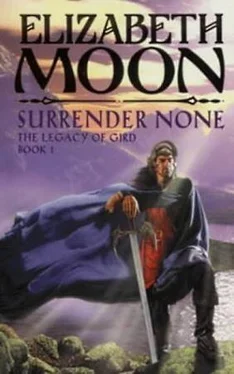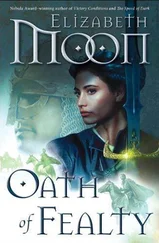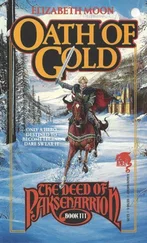Elizabeth Moon - Surrender None
Здесь есть возможность читать онлайн «Elizabeth Moon - Surrender None» весь текст электронной книги совершенно бесплатно (целиком полную версию без сокращений). В некоторых случаях можно слушать аудио, скачать через торрент в формате fb2 и присутствует краткое содержание. Жанр: Боевая фантастика, на английском языке. Описание произведения, (предисловие) а так же отзывы посетителей доступны на портале библиотеки ЛибКат.
- Название:Surrender None
- Автор:
- Жанр:
- Год:неизвестен
- ISBN:нет данных
- Рейтинг книги:3 / 5. Голосов: 1
-
Избранное:Добавить в избранное
- Отзывы:
-
Ваша оценка:
- 60
- 1
- 2
- 3
- 4
- 5
Surrender None: краткое содержание, описание и аннотация
Предлагаем к чтению аннотацию, описание, краткое содержание или предисловие (зависит от того, что написал сам автор книги «Surrender None»). Если вы не нашли необходимую информацию о книге — напишите в комментариях, мы постараемся отыскать её.
Surrender None — читать онлайн бесплатно полную книгу (весь текст) целиком
Ниже представлен текст книги, разбитый по страницам. Система сохранения места последней прочитанной страницы, позволяет с удобством читать онлайн бесплатно книгу «Surrender None», без необходимости каждый раз заново искать на чём Вы остановились. Поставьте закладку, и сможете в любой момент перейти на страницу, на которой закончили чтение.
Интервал:
Закладка:
The songs began that first night, with the talk around the fires of those who could talk, and by the next night a few were trying to fit words to familiar tunes. The dead king’s surviving musicians were glad to help. Gird was more than a little amused that the first version he heard of what became “Gird at Greenfields” was set to “The Thief’s Lament”—the very song with which he had been taunted for cowardice.
Part IV
Chapter Thirty-one
Greenfields broke the king’s power, and gave Gird control of the main grain-growing regions of Finaarenis. But it was not the end of the war. Those lords who had not joined the king’s army, for whatever reason, were now sure destruction loomed. Some walled themselves in Finyatha; others fled toward Tsaia. Heirs of lords killed at Greenfields squabbled over inheritances now in jeopardy; rich merchants, who assumed a peasant government would have no desire or need for fine goods, appealed to the remaining lords for help.
Gird knew all this, and much of it he had anticipated, but his first problem was securing the year’s limited harvest. Where there were no lords, there might be brigands. He split his army into sections, put each under a high marshal, and sent them to settle the countryside. He himself rode for the north, crossing the Honnorgat for the first time in his life on the gray horse, which seemed less like a broken-down carthorse every day. He could stay on at a trot now, although he preferred the swinging canter. Most of his marshals had caught a horse and learned to stay on it, as well. It made supervising a march or a movement much easier, and messages could pass far more quickly. Feeding the beasts was another worry, but men could not eat grass, and horses could. In summer, at least, they could afford a few horses.
Rumors of the king’s defeat spread even faster than Gird had expected. In the north, he and his column found mostly deserted, looted manor houses, and celebrating peasants. Few of his recruits had come from the north—in fact he had trouble understanding their speech—but they seemed genuinely pleased with his success. He wondered if the quickly-established bartons in each village would ever amount to anything, and prayed that war would not test them.
Finyatha offered a different problem. Largest and richest city of the north, the seat of the Finaarenisian kings, it hung just out of his reach like a tempting plum. Most of its people were common folk, as everywhere, but at the moment it swarmed with magelord refugees. He had no knowledge of siegecraft; common sense told him that assaulting those walls with pikemen would do no good—a much smaller force on the walls could defend it. He thought of trying to divert the river, but remembering Segrahlin’s tricks with water decided that some mage inside could simply call water into any well he wanted. In the end, he left it alone, and like an overripe plum, it fell on its own. One party of magelords tried to escape along the River Road to Tsaia; most of those fell to raiding parties, Gird’s or brigands. The rest were too weak to keep control of the city. When the disruption inside reached the gates, and the fighting erupted into the fields outside, Gird’s column—which had been waiting at a distance—marched in with little difficulty, to the apparent delight of all.
The gray horse brought Gird into those stone streets as if carrying a king; cheers racketed off the walls, and the flowers of summer fell on his shoulders, Alyanya’s blessing. Then the horse pranced into the courtyard before a towering stone structure that seemed to spring, like trees, from the roots of the world itself, and reach skyward with every stretched finger. Between its arches, great windows had stood; they were shattered now, glittering fragments crunched beneath the horse’s hoofs. A few pieces still clung to their frames, reflecting brightness against the cool darkness inside. The horse knelt; Gird stepped off and looked around. It was a hot day, blue-skied, and the courtyard had blue shadows under every ledge of gray stone. The very air shimmered; he blinked. Was it the air, or his eyes?
Arranha stood on the steps, between splintered doors. Gird would have been surprised, but could not quite feel it. “This was Esea’s High Hall,” Arranha said, as if he were a guide. “It became something else, something worse, and Esea’s blessing was withdrawn.” He shook his head. “I warned them, but they thought they could extract more power by bringing darkness and light so close together.”
Gird could not follow this, but he did follow Arranha into the partly ruined building. It soared overhead, high arches of stone, one after another rising from fluted pillars, making a space reminiscent of a great forest. At the far end, where a circular window had been, sunlight fired the lower arc to a silver crescent. Gird felt hairs rise on the back of his neck. He swallowed.
“You must see this,” Arranha was saying, “because you must decide if the gods demand this building be torn down. I myself would hate to see that; it’s the most beautiful in the north, to my eyes. But the people know what went on here; you must see for yourself.”
What he had to see was evidence enough that the magelords had lost all sense of right and wrong. Arranha tried to explain what they thought they were doing; to Gird, who had never sailed a ship, did not know a lodestone from any cobble in the river, who did not care about the theory behind it, it was simply disgusting and grotesque. An excuse, as he saw it, for some to bully others, to excuse their own cruelty on religious grounds. Here were the same symbols he had found in that count’s dungeon: the barbed chain, the masks with horns and spikes, painted to terrify, the instruments whose only purpose was pain. The place Arranha had led him to stank of old blood, death, and fear. He heard a nauseated gulp beside him, and turned to see Selamis at his side; he had followed Gird, as he often did, without speaking or asking permission.
“Don’t make it worse,” Gird said. “Go spew outside if you must. But this is your real inheritance from your father.” The younger man made it to the outside before he threw up. When he came back—to Gird’s surprise—he looked grim but in some way satisfied.
Gird came back out to find a crowd of those who had suffered under the old, and wanted his justice. His, he thought. The blue summer sky pressed down on him. Another than Alyanya had given him that victory; what did he want here? Justice, and all that came with it. The Hall?
The evil, he told them, is not in the stones, but in those who did wrong. Justice will rule here, the High Lord who judges all things rightly. He himself went to the crypt under Esea’s altar and scrubbed it until it stank no more of all that had happened in it. He brought in the holy herbs for the dead, and lay them reverently on the floor. He came up to find the crowd still standing, and scolded them as if they had been his yeomen for years. Cleaning before building, he said, waving his arms at the shattered glass in the courtyard.
With Finyatha fallen, the other lords in Finaarenis fled to Tsaia, where the Tsaian king gathered an army to retake that land and save his own. Gird ignored that for the present. They had not time before winter to mount a campaign; the Marrakai told him all he needed to know of preparations. He himself was back in Brightwater before snow fell, with Selamis and Arranha, to plan for the coming year.
Despite the destruction of farming villages and fields, they had more food than the year before. The lords’ granges had held a surprising amount; some had burned, but more had been saved. Many other goods were found in more abundance, though the distribution was not as even as Gird would have liked. But he did not interfere with anything but gross injustice. If these people were to help make their own fair laws, they would have to start by making some mistakes.
Читать дальшеИнтервал:
Закладка:
Похожие книги на «Surrender None»
Представляем Вашему вниманию похожие книги на «Surrender None» списком для выбора. Мы отобрали схожую по названию и смыслу литературу в надежде предоставить читателям больше вариантов отыскать новые, интересные, ещё непрочитанные произведения.
Обсуждение, отзывы о книге «Surrender None» и просто собственные мнения читателей. Оставьте ваши комментарии, напишите, что Вы думаете о произведении, его смысле или главных героях. Укажите что конкретно понравилось, а что нет, и почему Вы так считаете.












